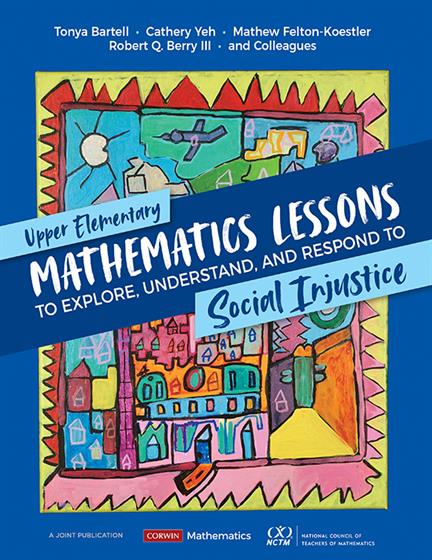
Hands-on, Practical Guidance for Educators
From math,
literacy, equity, multilingual learners, and SEL, to assessment, school counseling,
and education leadership, our books are research-based and authored by experts
on topics most relevant to what educators are facing today.
Upper Elementary Mathematics Lessons to Explore, Understand, and Respond to Social Injustice
Foreword by Julia M. Aguirre
Brian R. Lawler, Series Editor
Learn to plan instruction that engages upper elementary students in mathematics explorations through age-appropriate and culturally relevant social justice topics.
- Grade Level: 3-5
- ISBN: 9781071845516
- Published By: Corwin
- Series: Corwin Mathematics Series
- Year: 2022
- Page Count: 304
- Publication date: August 11, 2022
Review Copies
Description
“A very compelling set of fresh ideas are offered that prepare educators to turn the corner on advocating for social justice in the mathematics classroom. Each book is full of engaging activities, frameworks and standards that centers instruction on community, worldview, and the developmental needs of all students, a must needed resource to reboot our commitment to the next generation.”
Linda M. Fulmore
TODOS: Mathematics For ALL
Cave Creek, AZ
Empower students to be the change—join the teaching mathematics for social justice movement!
We live in an era in which students of all ages have—through media and their lived experiences— a more visceral experience of social injustices. However, when people think of social justice, mathematics rarely comes to mind. With a teacher-friendly design, this book brings upper elementary mathematics content to life by connecting it to student curiosity, empathy, and issues students see or experience.
Tested in Grades 3-5 classrooms, the model lessons in this book walk teachers through the process of applying critical frameworks to instruction, using standards-based mathematics to explore, understand, and respond to social justice issues. Learn to plan instruction that engages students in mathematics explorations through age-appropriate, culturally relevant topics, such as valuing differences, health and pay inequality, bullying, voting rights, and environmental justice. Features include:
- Content cross-referenced by mathematical concept and social issues
- Connection to Learning for Justice’s social justice standards
- Downloadable instructional materials and lesson resources
- Guidance for lessons driven by students’ unique passions and challenges
- Connections between research and practice
Written for teachers committed to developing equitable and just practices through the lens of mathematics content and practice standards as well as social justice standards, this book will help connect content to students’ daily lives, fortify their mathematical understanding, and expose them to issues that will support them in becoming active citizens and leaders.
Author(s)

Tonya Gau Bartell
Tonya Gau Bartell is currently an associate professor of mathematics education in the College of Education at Michigan State University and serves as the associate director of elementary programs. Tonya earned a BS in mathematics from St. Cloud State University, an MA in curriculum and instruction from the University of Minnesota, and a PhD. in curriculum and instruction at the University of Wisconsin-Madison. Tonya began teaching 25 years ago as a high school mathematics teacher, including 3 years as a founding teacher in an alternative high school to support students labeled as not succeeding by the system. For the last 15 years, she has volunteered in elementary mathematics classrooms and studies elementary mathematics education.
Tonya is passionate about learning about and supporting teachers in developing equitable mathematics instructional practices that recognize and transgress systemic inequity. She understands that issues of culture, race, ethnicity, identity, and power influence students’ opportunities to learn and teachers’ opportunities to teach mathematics and that these factors must be explicitly discussed and addressed if we hope to fully support equitable mathematics teaching and learning. Tonya is honored to have participated in the writing of this book and in continued efforts supporting mathematics education that explores, understands, and responds to social injustice and supports students’ learning of mathematics.

Cathery Yeh
Cathery Yeh. My students, their caregivers, and the communities I have had the privilege to work with remind me daily that students’ identities and their sense of belonging shape learning. I started teaching 24 years ago, beginning my tenure in dual-language classrooms
in Los Angeles and abroad in China, Chile, Peru, and Costa Rica. As a classroom teacher, I made home visits to every student home (over 300) and co-taught mathematics lessons with caregivers and community organizers to integrate students’ lived experiences, knowledge, and identities into the curriculum. As a learner of mathematics, my own schooling mirrors my research commitments to bilingualism, culturally sustaining pedagogies, and ethnic studies. I came to the United States at the age of 5. I was the only Emergent Bilingual student in class. At the end of the school year, I was retained. Kindergarten in California is optional, but I had to take it twice because I was not yet fluent in English. My first year of schooling in the United States highlights how too many of our children feel invisible in the classroom.
As a mathematics education scholar committed to equity and social justice, I acknowledge the many privileges I have and my role as both the oppressor and the oppressed. As a Chinese American scholar, educator, and community organizer living at this very time, I feel the rise of Asian hate crimes, prejudice, xenophobia, and discrimination. The Atlanta shooting is only a recent one in a legacy of anti-Asian violence in the Americas. Orientalist stereotypes of submissiveness, passiveness, and the exoticization of Asian women have not only led to the longstanding history of hypersexualization and violence, but they also have forced false obedience and compliance within the Asian American community. I recognize that oppression does not play out uniformly, but rather across the multitude of intersections of social identities, and it is often disguised through division and intentional pitting of one group against the other (e.g., using Asian Americans to perpetuate the myth of meritocracy and as a wedge our siblings of Color). I call on both my own Asian American siblings and the mathematics education community to disrupt the silence to injustice. We need to be loud.
What happens outside of the classroom can no longer be ignored. We’re in a critical moment where children are seeing injustice but not necessarily understanding the root and stem of the injustice. As educators, we have an obligation to teach and learn with children about these critical and complex issues. My hope is that this book can help spark conversations that attend to identities, histories, communities, and possibilities!

Mathew D. Felton-Koestler
Mathew D. Felton-Koestler. I am currently an associate professor in the Department of Teacher Education at Ohio University in Athens, Ohio, where I primarily teach mathematics methods courses for future elementary and middle school teachers. Before coming to Ohio University, I was in the Department of Mathematics at The University of Arizona where I taught mathematics content courses for future teachers. I received my B.S., M.A., and PhD from the University of Wisconsin–Madison.
I began my focus on education working with my former elementary teacher, Mazie Jenkins, to engage elementary students in exploring geometry through quilt design. Throughout my career I have benefited from opportunities to collaborate with practicing teachers in the classroom and in professional development settings. I attempt to approach my work with teachers as collaborative and have greatly valued this aspect of my work. I particularly enjoy the challenge of blending rich mathematics with explorations of our social and political world in tasks that are accessible to a broad audience. Prior to COVID-19, I co-ran a summer camp for middle school students to use mathematics to explore social and political issues related to their interests and look forward to returning to similar work in the future.

Robert Q. Berry III
Robert Q. Berry III is the Dean of the College of Education at the University of Arizona and the Paul L. Lindsey & Kathy J. Alexander Chair. Berry served as President of the National Council of Teachers of Mathematics (NCTM), 2018–2020. He holds a B.S. in middle grades education from Old Dominion University, a M.A.T. in mathematics education from Christopher Newport University, and a Ph.D. in mathematics education from the University of North Carolina at Chapel Hill. He taught in public schools and served as a mathematics specialist.
Robert has collaborated with teachers, leaders, parents, and community members across the United States and has been a teacher at nearly all levels. These experiences have afforded him a perspective on the issues facing mathematics teaching and learning across diverse contexts. He sees himself as a teacher who is always learning and improving my professional practice. He brings a strong sense of equity and fairness, rooted in my understanding of the mathematical experiences of students of color and the belief that all students deserve access to learning environments and resources that support their engagement with mathematics. He brings an ability to establish rapport and trust with people from diverse backgrounds by working to understand their perspectives, histories, and lived experiences. He understands the importance of building partnerships and how to draw on each partner's strengths to achieve a common goal. In sum, he brings experiences and abilities that make me an effective advocate for teachers and students.
Table of Contents
Preface
Introduction
Chapter 1: What Is Social Justice, and Why Does it Matter in Teaching Mathematics?
Chapter 2: Fostering a Classroom Community for Social Justice
Chapter 3: Instructional Tools for a Social Justice Mathematics Lesson
Chapter 4: Teaching the Social Justice Mathematics Lesson
Chapter 5: Mathematics Lessons for Building and Examining Identities
Lesson 5.1 Families Matter
Lesson 5.2 Playground Prejudice
Lesson 5.3 Who Appears in Billboards?
Lesson 5.4 Family Story Problems
Lesson 5.5 Exploring Maskmatics! Socio-cultural and Environmental Concerns in Disposable Masks during COVID-19
Lesson 5.6 Challenging Ableist Assumptions in Math Problems
Chapter 6: Mathematics Lessons on Society and Social Movements
Lesson 6.1 Tu Lucha es mi Lucha: Mathematics for Movement Building
Lesson 6.2 Exploring Equitable Pay for Work
Lesson 6.3 Modeling Library Funding
Lesson 6.4 Value of a School Lunch
Lesson 6.5 More Than an Athlete
Lesson 6.6 Your Action Saves Lives: COVID-19 and Systems Thinking
Chapter 7: Mathematics Lessons to Understand Our World
Lesson 7.1 Water is Our Right, Water is Our Responsibility
Lesson 7.2 Upper Elementary Math to Explore People Represented in Our World and Community
Lesson 7.3 Single Use Plastics
Chapter 8: Advice From the Field
Chapter 9: Creating Social Justice Mathematics Lessons for Your Own Classroom
Appendix A: Additional Resources
Appendix B: Lesson Resources
Appendix C: Catalyzing Change: Five Mathematical Content Domains in Grades 3–5
Appendix D: Social Justice Standards and Topics
Appendix E: Lessons by Catalyzing Change Mathematical Content Domains, Social Justice Outcomes, and Social Justice Topics
Appendix F: Social Justice Mathematics Lesson Planner
References
Reviews
A wonderful collection of lessons, submitted by teachers, to help students of all ages see topics they care about, and use mathematics as a tool for progress in the world.Jo Boaler
Stanford University
A very compelling set of fresh ideas are offered that prepare educators to turn the corner on advocating for social justice in the mathematics classroom. Each book is full of engaging activities, frameworks, and standards that center instruction on community, worldview, and the developmental needs of all students—a much-needed resource to reboot our commitment to the next generation.Linda M. Fulmore
TODOS: Mathematics For ALL
Upper Elementary Mathematics Lessons to Explore, Understand, and Respond to Social Injustice is an outstanding addition to the growing number of texts and projects that weave the teaching of mathematics and social justice together. The authors go deep and broad to show how, why, and when this combination of curricular topics improves our students’ mathematical understandings while honing their abilities and dispositions to promote social and environmental justice in their own lives and communities.Bob Peterson
Teaching mathematics for social justice affirms the relevance of mathematics instruction to the “real world” and equips educators and students to turn their engagement with mathematics concepts into positive social action. Equal parts approachable and challenging, the lessons get students thinking critically about how mathematics helps them to understand, identify injustice, and develop the skills and confidence to right it.Jonathan Tobin
Learning for Justice
This is the book so many of us in upper elementary mathematics have been waiting for. It’s practical, justice oriented, and student-centered. For elementary school teachers looking to integrate social justice lessons with a relevant and timely lens, this book will be instantly applicable to your practice. For everyone else, this book demonstrates that social justice mathematics is critical to the work we must do for our students, our communities, and our profession as mathematics teachers!José Luis Vilson
EduColor
This book is a much-needed and timely resource for teachers, coaches, school leaders, and teacher educators. The authors offer a wide array of lessons that get to the heart of teaching mathematics for social justice for students in Grades 3–5. The diverse topics share a common thread: a commitment to students’ learning grounded in meaningful and relevant explorations.Marta Civil
The University of Arizona
I imagine many people will purchase this book for the sample lesson plans. And you should; they’re fabulous. But just as fabulous, and equally important, is the framework the authors lay out for a comprehensive, holistic, transformative approach to mathematics teaching, with social justice at its core.Paul C. Gorski
Equity Literacy Institute
As a teacher educator for social justice, I am familiar with the near-constant refrain of “this isn’t something you can do in math!” This book illustrates just the opposite. Indeed, not only is it possible to engage in social justice mathematics, but it is an educational imperative to do so. This much-needed and valuable collection provides practitioners with clear and compelling lessons that are grounded in theories of justice and equity. Especially timely in this text is the clear evidence that not only can upper elementary–aged children engage in critical conversations, problem solving, and sociocultural analysis in their mathematics classes, but they must. The editors and contributors to this volume have curated a powerful resource that is a must-read for all mathematics educators and those who care about social justice teaching and learning.Alyssa Hadley Dunn
Michigan State University
Review Copies
Related Professional Learning
Related WebinarsRelated Resources
- Access to companion resources is available with the purchase of this book.
- Lesson 5.6: Challenge Ableist Assumptions in Mathematics Problems [Lessons and Strategies]

